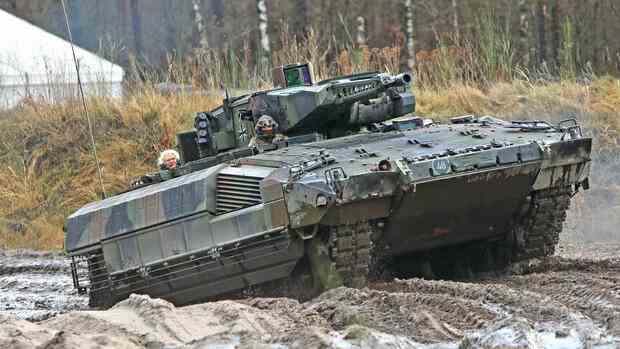Berlin Despite the recent series of breakdowns, the Federal Government and the Bundeswehr want to stick with the Puma infantry fighting vehicle, but work together with industry on improvements. “We need a reliable system,” said Federal Defense Minister Christine Lambrecht (SPD) on Friday after a meeting with Inspector General Eberhard Zorn and the heads of the manufacturing companies Rheinmetall and Krauss-Maffei Wegmann (KMW). “The Puma has a clear future with us in the Bundeswehr,” emphasized Zorn.
At the end of last year, all 18 deployed Pumas failed during a multi-week exercise by a company of Panzergrenadier Battalion 112 at the Army’s target practice center in Munster. The vehicles were intended for the NATO Rapid Reaction Force (VJTF), in which Germany is leading the multinational land forces this year.
Defense Minister Lambrecht then announced that the troops would use the 50-year-old Marder infantry fighting vehicle for the VJTF mission. In addition, the ministry initially did not place the order for the modernization of tanks that had already been delivered, even though the budget committee of the Bundestag had already approved 850 million euros for this.
The authorities also made the order for a further Puma batch dependent on the vehicles being able to prove their suitability for use.
Top jobs of the day
Find the best jobs now and
be notified by email.
On Friday, Minister Lambrecht defended these steps, which should initially last: “Anything else would have been irresponsible, because of course I also represent the interests of taxpayers,” she said. Together with the industry, they will now work to turn the Puma into a reliable weapon system.
Puma, Marder and Co: Read more about the topic here:
After the series of breakdowns, the manufacturers Rheinmetall and KMW subjected the defective vehicles to a fault analysis together with the German armed forces. According to the Ministry of Defence, mostly minor and medium-sized damage was found, which could have been dangerous in a possible battle.
“The Puma has a clear future with us in the Bundeswehr.”
(Photo: dpa)
The soldiers should now be better trained to deal with damage to the Puma. Perhaps the necessary experience is still missing, said Zorn. In the future, however, logistics must also be guaranteed for exercises in order to be able to repair damage, Lambrecht emphasized. She also expects some design changes from the industry.
KMW boss Ralf Ketzel said it was “well-established practice” to use experience from the troops for constructive improvements. “This makes the systems more robust.” The robustness of the Puma tank now has to be brought to a level that is appropriate for the VJTF. This topic will be addressed in a concentrated manner in the near future.
When it comes to the procurement of highly complex systems, politics, the Bundeswehr and industry will have to communicate even more clearly in future about what is expected of each other, for example in terms of schedules, said the Defense Minister. “We can still get a lot better there.”
Majority of citizens reject delivery of Leopard tanks to Ukraine
When asked about possible deliveries of Leopard main battle tanks to Ukraine, Lambrecht emphasized that the German government’s position had not changed. Poland has announced that it wants to supply Leopard tanks as part of a coalition. Thus, before the next meeting of the Ukraine-supporting countries in Ramstein on January 20, the pressure on Germany is increasing.
“We don’t always have to make a decision when positions are brought to the attention of the federal government from outside,” said the defense minister. Vice Chancellor Robert Habeck (Greens), on the other hand, had declared that the federal government should not stand in the way if other countries wanted to lead the way in supplying battle tanks.
>> Read here: Why does Ukraine most want the Leopard 2?
Since the Leopard tanks were produced in Germany, Poland would have to obtain an export license from the Federal Ministry of Economics. According to deputy government spokeswoman Christiane Hoffmann, the federal government had not received any applications for the transfer of battle tanks by Friday afternoon.
The majority of the population rejects a delivery of Leopard tanks. According to the ZDF political barometer published on Friday, 42 percent of those surveyed are in favor, but 46 percent are against. Chancellor Olaf Scholz (SPD) said the citizens supported the government’s cautious course in the tank debate.
More: Fight, protect, scout – which tank type can do what?
